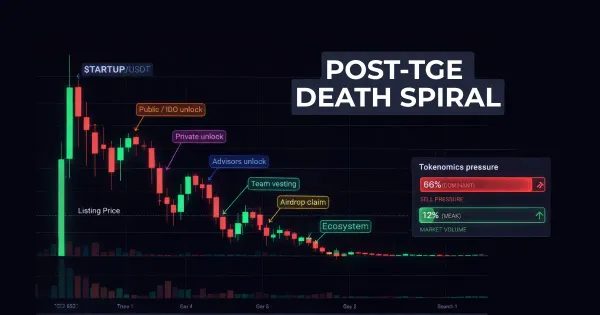What Does Crypto Market Volatility Mean for The Startup Community?

As of January 2022, $1 trillion had been lost in the global cryptocurrency market – that was from Bitcoin’s all-time high of almost $69,000 in November 2021. Since then, Bitcoin, the largest cryptocurrency, has further lost 35%+ of its value.
Despite this ‘gloomy’ news, more investors are stocking up on crypto-assets and funding this emerging technology as they see it as the future – 25% of American investors now back blockchain protocols.
However, this volatility has made many sceptical investors call cryptocurrencies and blockchain technology a 'fad'. Is this really true?
Before delving into the opportunities blockchain technology has for the startup community, let’s explore some of the reasons why the cryptocurrency market is so volatile.
Why is the cryptocurrency market so volatile?
It’s an emerging market
When compared to markets like the US stock exchange and gold that have been around for hundreds of years, the crypto market is an emerging market. It’s only been around since 2009 and has a market cap of only $1.2 trillion: this is unlike stocks and gold markets which are valued at around $27.2 trillion and $11.7 trillion, respectively.
Its smaller market cap means that smaller forces including personalities and the media can greatly influence its price. If a couple of whales bet on the prices of crypto going up or down and decide to pump or dump $50 billion worth of Bitcoin, it will have a massive effect on the entire crypto market. Also, we saw how Bitcoin crashed when Tesla announced they’ll stop accepting crypto as payment, and when Dogecoin rose when Elon tweeted ‘Doge’.
These kinds of influences make trading crypto often very speculative in these nascent stages rather than traditionally functional. And this fuels the market volatility.
The crypto market is digital
Unlike other markets whose value is tied to physical assets or commodities, crypto's are digital. This makes the price dependent on sentiment, demand, and supply. This is especially true of young investors seeking opportunities to get rich quickly. When they feel there will be a rise in the price of Bitcoin, they’ll sell their crypto. But when they’re on the losing end, they’ll pull out of the market. It can be said that there is more of an emotional investment factor in crypto market than there is in traditional markets.
Investor sentiment and profile
When compared to markets like the stock market and real estate, there’s a low barrier to entry in the crypto space. This makes it the go-to market for inexperienced traders. In contrast to other markets where you’ll need a minimum amount of capital, trading license, or a lawyer, all that’s needed to trade crypto is an internet connection and a little amount of cash.
Also, many institutional investors are sceptical of the crypto market as they see it as too risky. These two factors create volatility in the cryptocurrency market as it’s susceptible to manipulation. Also, in situations where experienced investors will be unperturbed, inexperienced investors can react to the hype and FUD (fear, uncertainty, and doubt) around the market.
How can blockchain startups benefit from crypto market volatility?
We’ve seen prices of cryptos rise and fall over the years: this volatility is a feature of an emerging market, not a bug. As a matter of fact, investors haven’t lost faith in the technology – many actually still believe it’s the future. So they know, as with all new technologies, it’ll take time to gain acceptance.
According to Shan Aggarwal, Head of Corporate Development and Ventures at Coinbase, the fundraisers that have produced some of the most successful blockchain projects were done in the bear market of 2018-2020 (the likes of Polygon, Avalanche, Polkadot, Axie Infinity, Solana, and more).
So despite the dip, investment interests in crypto startups remain strong as investors understand it’s a maturing market. This is evident in the fact that the first quarter of 2022 saw crypto startups raise $5 billion in VC funds. This is opposed to the dwindling funding in other tech areas.
Despite investors backing more Web3 projects now, some are taking a more laidback approach to funding. They better understand the emerging technology now. Although Bitcoin is the world’s largest cryptocurrency, investors know it has no utility. However, due to its status, investors will most likely continue to stock up on Bitcoins as a speculative asset rather than a functional one.
So when funding protocols, investors are looking out for their long-term utility and functionality over those promising very high returns as many of the latter have turned out to be Ponzi-like and economically unsustainable.
Another reason for crypto market volatility is the sustainability (environmental) and scalability issues surrounding the technology.
Investors are wary of the high amount of electricity it consumes and the high transaction charges users have to pay. To solve this, innovative Layer 1 projects are looking at more sustainable practices of running their protocols. Ethereum, which powers most of the blockchain, is transitioning from Proof-of-Work to a greener Proof-of-Stake.
Another way Blockchain startups can overcome volatility is through tokenization. We discussed earlier that one of the reasons cryptocurrencies are volatile is because their prices are dependent on supply and demand. However, if crypto startups can tokenize physical assets, their prices will hold more physical value and be more stable. RedSwan CRE is an example of such companies tokenizing physical assets. They've developed a marketplace for investors to invest in commercial real estate, such that while you buy crypto on other DeFi marketplaces, you'll buy portions of real estate on RedSwan's marketplace.
Also, people are pushing for the crypto market to be regulated. While that is underway, there’s advancement in developing more efficient cryptocurrency products such as spot bitcoin exchange-traded funds. When these spot-price ETFs are made available in marketplaces, there will be an influx of new crypto investors.





